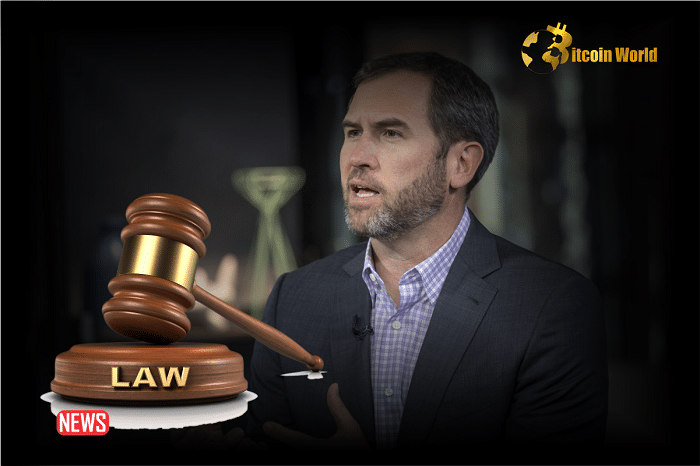Just when you thought the Ripple saga couldn’t get any more intriguing, another legal chapter unfolds! Ripple Labs, along with its CEO Brad Garlinghouse and subsidiary XRP II, LLC, are once again in the legal spotlight. This time, it’s a class-action lawsuit filed in the Northern District of California, throwing fresh fuel onto the ongoing debate about XRP’s status and Ripple’s operations. Buckle up, crypto enthusiasts, because this is another twist in the Ripple narrative you won’t want to miss.
What’s the Buzz About This New Ripple Lawsuit?
Let’s cut to the chase. This isn’t the SEC showdown we’ve all been following. This is a new lawsuit, and it’s all about allegations that Ripple violated federal and California securities laws. The core accusation? That Ripple allegedly offered and sold XRP as an unregistered security. Yes, you heard that right – unregistered securities. This claim strikes at the heart of the long-standing debate surrounding XRP’s classification.
Here’s a quick breakdown of the key allegations:
- Unregistered Securities Sales: The lawsuit claims Ripple, Brad Garlinghouse, and XRP II, LLC engaged in the sale of XRP without the necessary registration with regulatory bodies.
- Violation of Securities Laws: Plaintiffs argue that these alleged unregistered sales are a direct violation of both federal and California state securities laws.
- Class Action Suit: This isn’t just one person suing. It’s a class-action, meaning it aims to represent a group of individuals and entities who purchased XRP during a specific period – from July 3, 2017, to June 30, 2023.
Who Can Claim Compensation? Are You Affected?
If you were holding or trading XRP during the period between July 3, 2017, and June 30, 2023, this lawsuit might directly concern you. According to the lawsuit, individuals and entities who purchased XRP within this timeframe may have the right to seek compensation.
The lawsuit spells out potential remedies for affected parties:
- If you still hold XRP: You might be able to recover the original purchase price plus interest, minus the current XRP price. Alternatively, you could tender (offer to return) your XRP.
- If you sold XRP at a loss: You might be entitled to damages to cover your losses.
See Also: Ripple CEO Brad Garlinghouse Says It “Makes Sense” To Have XRP ETF
Ripple’s Counter-Argument: XRP is NOT a Security!
Unsurprisingly, Ripple is not backing down. Their defense hinges on a familiar argument: XRP is not a security. This is the same battle cry they’ve used in the SEC case. Ripple maintains that XRP functions primarily as a digital currency for global transactions, and therefore, shouldn’t be classified as a security requiring registration.
This stance is crucial for Ripple. If XRP is deemed a security, it would have significant implications for its operations, regulatory compliance, and future prospects. The outcome of this lawsuit could further solidify or challenge XRP’s legal standing in the US.
Deja Vu? Echoes of the SEC Lawsuit
This new lawsuit arrives hot on the heels of Ripple’s partial victory in the SEC case. You might recall that in the SEC action, the judge ruled that XRP was not a security when sold to retail investors via exchanges. This was a significant win for Ripple, but the SEC case is far from over, and this new class-action suit adds another layer of complexity.
To recap the SEC saga briefly:
- SEC Lawsuit (December 2020): The SEC alleged that Ripple conducted an unregistered securities offering of $1.3 billion through XRP sales.
- Partial Win for Ripple: The judge ruled that programmatic sales of XRP on exchanges were not securities transactions.
- Ongoing Legal Battle: The SEC case continues, particularly concerning institutional sales of XRP.
See Also: Ripple Acquires Standard Custody & Trust Co. To Expand Service Offerings In The US
What’s Next? Key Dates and Implications
For those potentially involved in the class action, there’s a critical date to mark on your calendar: April 5th. This is the deadline for class action members to exclude themselves from the lawsuit.
Why would someone opt-out? By excluding themselves, individuals or institutions retain the right to pursue their own independent legal actions against Ripple for compensation. This might be relevant for larger investors who believe they could secure a more favorable outcome by acting alone.
The Bottom Line: More Legal Wrangling for Ripple
The cryptocurrency world is no stranger to legal battles, and Ripple seems to be a frequent player in this arena. This new class-action lawsuit underscores the ongoing regulatory uncertainty surrounding cryptocurrencies and the classification of digital assets as securities.
While Ripple has celebrated partial victories, the legal challenges continue to mount. The outcome of this class-action suit, alongside the still-active SEC case, will undoubtedly shape Ripple’s future and have broader implications for the crypto industry. Stay tuned as this legal drama unfolds – it’s far from over!
#Binance #WRITE2EARN
Disclaimer: The information provided is not trading advice, Bitcoinworld.co.in holds no liability for any investments made based on the information provided on this page. We strongly recommend independent research and/or consultation with a qualified professional before making any investment decisions.




